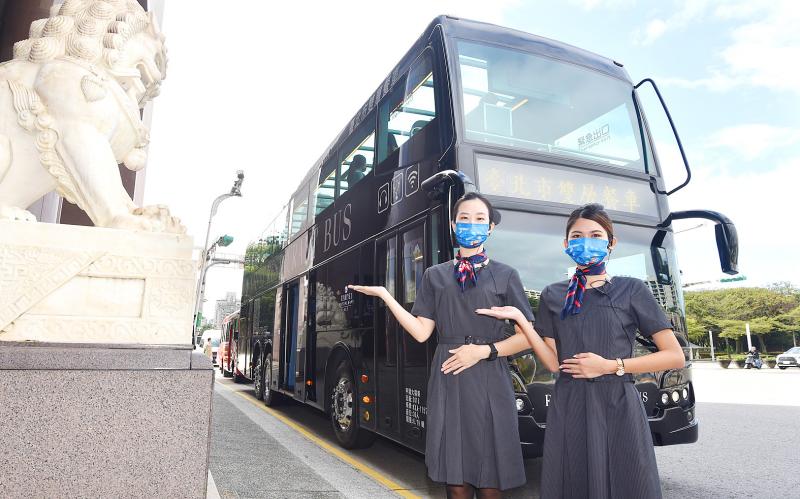The Taipei Department of Information and Tourism yesterday inaugurated the city’s first-ever luxury double-decker restaurant bus at City Hall Square ahead of entertaining fine-dining enthusiasts from Tuesday next week.
Starting yesterday, people could book tables for the 26-seater’s daily afternoon tea service and twice-daily dinner service, with those hopping on the bus treated to dishes prepared in the lower-deck kitchen by the Regent Taipei (台北晶華酒店).
A round trip is to take about 90 minutes for afternoon tea and two hours for dinner, said Eric Hsu (徐偉朝), chief operating officer of Sanjin Integrated Marketing Co (三晉整合營銷), the main operator of the bus service.

Photo: Liao Cheng-hui, Taipei Times
At the inauguration ceremony, Taipei Deputy Mayor Tsai Ping-kun (蔡炳坤) said that the restaurant bus would take patrons on a tour of the city’s landmarks and renowned sights while enjoying a quality meal.
“We want to promote the city as an open museum with the whole city ready for patrons to explore,” Tsai said. “So, we are happy that Taiwan’s first double-decker restaurant bus is set to hit the road.”
The service, which begins and ends at the Taipei City Hall MRT Station on Tuesday to Sunday, is to cruise past many of the city’s landmarks, such as National Sun Yat-sen Memorial Hall and Taipei 101, Hsu said.
The idea for the service came from a survey conducted overseas two years ago, which found that cities such as Tokyo, Bangkok, London and Hong Kong had similar restaurant buses, he said.
“We learned from these surveys that they have had this type of bus for many years, and we wanted to bring the experience to Taipei,” Hsu added.
Although the tourism industry over the past two years has been affected by the COVID-19 pandemic, Taiwan’s situation is relatively stable, Tsai said, adding that the time is right to launch the bus-based fine-dining experience.
“If the global pandemic is controlled and restrictions on travel can be eased, allowing international tourists to visit Taiwan, we estimate that after six months, the service would benefit the whole tourism industry in Taipei,” Tsai said.

Taiwan Semiconductor Manufacturing Co (TSMC, 台積電) last week recorded an increase in the number of shareholders to the highest in almost eight months, despite its share price falling 3.38 percent from the previous week, Taiwan Stock Exchange data released on Saturday showed. As of Friday, TSMC had 1.88 million shareholders, the most since the week of April 25 and an increase of 31,870 from the previous week, the data showed. The number of shareholders jumped despite a drop of NT$50 (US$1.59), or 3.38 percent, in TSMC’s share price from a week earlier to NT$1,430, as investors took profits from their earlier gains

In a high-security Shenzhen laboratory, Chinese scientists have built what Washington has spent years trying to prevent: a prototype of a machine capable of producing the cutting-edge semiconductor chips that power artificial intelligence (AI), smartphones and weapons central to Western military dominance, Reuters has learned. Completed early this year and undergoing testing, the prototype fills nearly an entire factory floor. It was built by a team of former engineers from Dutch semiconductor giant ASML who reverse-engineered the company’s extreme ultraviolet lithography (EUV) machines, according to two people with knowledge of the project. EUV machines sit at the heart of a technological Cold

TAIWAN VALUE CHAIN: Foxtron is to fully own Luxgen following the transaction and it plans to launch a new electric model, the Foxtron Bria, in Taiwan next year Yulon Motor Co (裕隆汽車) yesterday said that its board of directors approved the disposal of its electric vehicle (EV) unit, Luxgen Motor Co (納智捷汽車), to Foxtron Vehicle Technologies Co (鴻華先進) for NT$787.6 million (US$24.98 million). Foxtron, a half-half joint venture between Yulon affiliate Hua-Chuang Automobile Information Technical Center Co (華創車電) and Hon Hai Precision Industry Co (鴻海精密), expects to wrap up the deal in the first quarter of next year. Foxtron would fully own Luxgen following the transaction, including five car distributing companies, outlets and all employees. The deal is subject to the approval of the Fair Trade Commission, Foxtron said. “Foxtron will be

INFLATION CONSIDERATION: The BOJ governor said that it would ‘keep making appropriate decisions’ and would adjust depending on the economy and prices The Bank of Japan (BOJ) yesterday raised its benchmark interest rate to the highest in 30 years and said more increases are in the pipeline if conditions allow, in a sign of growing conviction that it can attain the stable inflation target it has pursued for more than a decade. Bank of Japan Governor Kazuo Ueda’s policy board increased the rate by 0.2 percentage points to 0.75 percent, in a unanimous decision, the bank said in a statement. The central bank cited the rising likelihood of its economic outlook being realized. The rate change was expected by all 50 economists surveyed by Bloomberg. The